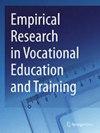Tertiary students’ perceptions of hospitality careers in Vietnam
IF 3.1
Q2 EDUCATION & EDUCATIONAL RESEARCH
Empirical Research in Vocational Education and Training
Pub Date : 2018-12-01
DOI:10.1186/s40461-018-0075-6
引用次数: 0
Abstract
BackgroundHospitality personnel are often prepared through vocational education and training (VET) and higher education (HE) providers, taking different emphases. In Vietnam’s hospitality workplaces, HE graduates compete with VET graduates for the same basic operational positions, with limited managerial positions available. Given the different educational pathways taken for similar career opportunities in the current labour market, it is important to understand students’ views of hospitality workplaces as their future career environment. The aim of this study is to identify and examine underlying factors that determine tertiary students’ overall career perceptions in hospitality in the Vietnamese context.MethodsA quantitative study utilising an online survey was conducted with 234 hospitality students from different higher education institutes and VET colleges in the South of Vietnam. Chi squared statistics and logistic regression were performed to assess the views and significant educational level differences.ResultsThe analyses show marked differences in views between the HE and VET participants on several aspects of hospitality workplaces, including pay/promotion opportunities, management, and commitment to the industry. The HE participants appeared less positive, and indicated a lower commitment to a future in the hospitality industry.ConclusionThe results of this study have important implications for various stakeholder groups. Students’ negative perceptions, associated with their internship experiences in different aspects of hospitality workplaces, currently appear to result in detrimental consequences for HE students, with many not planning on remaining in the hospitality sector. This has both short-term and long-term implications for hospitality employers, hospitality educational providers, and Vietnam’s HE system.大专学生对越南酒店业职业的看法
背景酒店业人员通常是通过职业教育与培训(VET)和高等教育(HE)机构培养出来的,两者侧重点不同。在越南的酒店业工作场所,高等教育毕业生与职业教育与培训毕业生竞争同样的基本业务岗位,只有有限的管理岗位可供选择。鉴于在当前的劳动力市场上,学生通过不同的教育途径获得相似的职业机会,因此了解学生对酒店业工作场所作为其未来职业环境的看法非常重要。本研究旨在确定并研究决定越南大专学生对酒店业总体职业看法的潜在因素。研究方法通过在线调查对来自越南南部不同高等院校和职业教育与培训学院的 234 名酒店业学生进行了定量研究。结果分析表明,高等教育和职业教育与培训的参与者对酒店业工作场所的几个方面的看法存在明显差异,包括薪酬/晋升机会、管理和对行业的承诺。高等院校的参与者显得不那么积极,对未来从事酒店业的承诺也较低。学生在酒店业工作场所不同方面的实习经历所产生的负面看法,目前似乎对高校学生造成了不利影响,许多学生不打算继续留在酒店业工作。这对酒店业雇主、酒店业教育机构和越南的高等教育体系都有短期和长期的影响。
本文章由计算机程序翻译,如有差异,请以英文原文为准。
求助全文
约1分钟内获得全文
求助全文
来源期刊

Empirical Research in Vocational Education and Training
Social Sciences-Education
CiteScore
3.40
自引率
7.70%
发文量
9
审稿时长
13 weeks
期刊介绍:
The main focus of this journal is to provide a platform for original empirical investigations in the field of professional, vocational and technical education, comparing the effectiveness, efficiency and equity of different vocational education systems at the school, company and systemic level. The journal fills a gap in the existing literature focusing on empirically-oriented academic research and stimulating the interest in strengthening the vocational part of the educational system, both at the basic and higher education level.
 求助内容:
求助内容: 应助结果提醒方式:
应助结果提醒方式:


